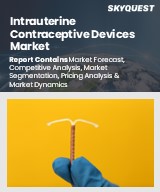
Report ID: SQMIG35A3009
Skyquest Technology's expert advisors continuously track and analyze the latest developments and updates related to intrauterine contraceptive devices market. Our team of analysts stay abreast of all the recent news stories shaping the industry including new product launches by major companies, strategic partnerships, M&As, Patent filings and industry and regulatory developments.
REQUEST FOR SAMPLE
Global Intrauterine Contraceptive Devices Market size was valued at USD 4.4 billion in 2023 and is poised to grow from USD 4.6 billion in 2024 to USD 6.6 billion by 2032, growing at a CAGR of 4.6% during the forecast period (2025-2032).
The market for intrauterine contraceptive devices (IUD) is highly competitive with established vendors and new-generation companies. Bayer AG possesses the largest market share of approximately 35% because of its differentiated hormonal IUD portfolio, i.e., Mirena, Skyla, and Kyleena, which cater to different patient segments. Merck & Co. possesses the second with approximately 25% market share because of its strong business in hormonal and copper IUD markets, especially in emerging markets. Firms are emphasizing product innovation, i.e., concentrating on the development of small, flexible IUDs for nulliparous women and growing in emerging markets in strategic alliances and public education campaigns. 'Teva Pharmaceutical Industries Ltd. (Jerusalem)', 'Bayer (Germany)', 'EUROGINE (Spain)', 'CooperSurgical Inc. (US)', 'Pfizer Inc. (US)', 'HLL Lifecare Limited (Thiruvananthapuram)', 'OCON Medical Ltd. (Israel)', 'Prosan International BV (Netherlands)', 'Melbea Innovations (Hungary)', 'Allergan, Merck & Co., Inc. (US)', 'DKT International (US)', 'Medisafe Distribution Inc. (Canada)', 'Medicines360 (US)', 'Pregna International Limited (India)', 'Egemen International (Turkey)'
Increasing uptake of long-acting reversible forms of contraception, including intrauterine contraceptive devices (IUDs), is one of the key market drivers. Women are increasingly opting for methods that are effective, low maintenance, and long-acting in preventing pregnancy. IUDs are over 99% effective and have a duration of 3–10 years, depending on the type, and hence provide a convenient option to short-term or daily contraceptives. Secondly, healthcare professionals actively prescribe LARC methods as a first-line contraceptive method and hence propel the use of IUDs. Awareness campaigns regarding the convenience and reliability of LARCs are leading to greater acceptability among various demographic and geographical segments.
Increasing Demand for Non-Hormonal Contraceptives: The demand for non-hormonal intrauterine contraceptive devices is increasing rapidly as more women opt for hormone-free options. Devices such as the Copper IUD are becoming popular due to their long-term nature but non-interference with hormonal balances. This trend is especially strong in those markets with consumers who are health-conscious and choose non-invasive, hormone-free products to escape side effects of hormonal birth control. The market is reacting to the need for more comfort and design in non-hormonal IUDs to meet this increasing demand, and they are now a competitive product on global markets.
What makes North America the top market for Intrauterine Contraceptive Devices in 2024?
Want to customize this report? This report can be personalized according to your needs. Our analysts and industry experts will work directly with you to understand your requirements and provide you with customized data in a short amount of time. We offer $1000 worth of FREE customization at the time of purchase.
Feedback From Our Clients

Report ID: SQMIG35A3009
sales@skyquestt.com
USA +1 351-333-4748